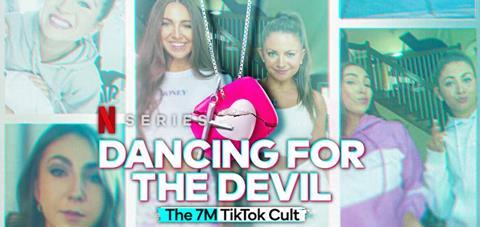This new Netflix documentary about a cult leader is hard viewing for Christians, but could help us identify the early warning signs of spiritual abuse, says Giles Gough

Dancing for the Devil: The 7M TikTok Cult landed on Netflix at the end of last month, shocking audiences with its allegations of cult-like behaviour inside 7M Films, an LA-based talent management company that describes itself as “representing some of the top social media influencers in the world”.
This compelling three-part docuseries follows the story of Melanie and Miranda Wilking, professionally known as ‘The Wilking Sisters’, a pair of dancing siblings who once ran a popular TikTok channel.
Before 2019, Miranda and Melanie were very close – and they were successfully carving out a career path creating their own content and gaining lucrative brand partnerships. But in April of that year, Miranda received a request to collaborate from a fellow dancer named James ‘BDash’ Derrick. Their working relationship quickly blossomed into a romantic one. Then James’s videographer, Isaiah Shinn, introduced the couple to a ‘church’, known as Shekinah, run by Isaiah’s father, Robert Shinn.
Robert Shinn styles himself as ‘a man of God’, and during his four-hour church services he teaches strict obedience. When the ‘pastor’ found that his LA-based church was attracting young impressionable dancers, he formed ‘7M Films’.
7M is ostensibly a management company that organises the lives of the dancers it represents. Shinn, as their manager and spiritual leader, encourages the young people to live together and he has enormous control over what they do. The Netflix documentary interviews former cult members, exposing alleged financial, spiritual and sexual abuse going back decades.
As Miranda gradually fell further into the orbit of 7M Films/Shekinah church, she cut all ties with her sister, Melanie, and her parents. After months of no contact with Miranda, the Wilking family released a 40-minute video on TikTok, outlining their fears that Miranda was being prevented from contacting them.
Financial, spiritual and sexual abuse
Many of us watch documentaries about cults, largely to make sure we never end up in a one. But the word ‘cult’ is a provocative term. ‘High control group’ might be more appropriate. If you’ve watched any similar shows about groups like NXIVM or Twin Flames Universe, many of the themes will be depressingly familiar in Dancing for the Devil.
A seemingly vibrant, but vulnerable person, gets drawn into a group run by a charismatic leader. As time goes on, the control slowly ratchets up until the vulnerable person is all but unrecognisable from their former selves.
In Dancing for the Devil the financial abuse of Robert Shinn is laid bare. His company, 7M Films, takes a 20 per cent management fee, and on top of that members of Shekinah church are expected to tithe 10 per cent of their earnings and then give an additional 10 per cent in offering. They also have to pay $2,200 in rent and contribute towards an in-house videographer and hair and makeup artists. According to the documentary most, if not all, this money makes its way back to Shinn, leaving the dancers with next to nothing, which increases their dependence on 7M Films.
Spiritual abuse, done in Jesus’ name, makes it so much harder to convince people that Jesus is the way, the truth and the life
Priscylla and Melanie Lee were drawn into Shekinah church when they were teens in the early 2000s. Melanie escaped after ten years, but Priscylla stayed, and was subjected to alleged spiritual and sexual abuse in Shekinah church for another decade.
In a compelling scene after the two sisters reunite, Melanie tries to hold Priscylla to account for being late to a child’s birthday party. Pryscilla verbally attacks her in response; it seems after spending her entire adult life in a cult, she can’t tell the difference between a reasonable and unreasonable request.
Other aspects of the series are sobering in a way that has nothing to do with the cult. The sheer number of women required to report a sexual assault allegation in order for it to be taken seriously is shocking, as is the poor performance of the LA Police department when it comes to dealing with victims of sexual crimes. One woman describes being afraid to report what happened to her, because the process would be too traumatic.
Miranda Wilking’s parents take the lead in advocating for the loved ones of people still stuck in Shekinah church. They are presented in the documentary as a reasonably well-off mid-western couple who are able to utilise their other daughter’s TikTok platform to draw attention to the problem. It’s heartbreaking to think of the people in the same position without the luxury of that much time and resources to devote to seeking justice.
Spiritual abuse, done in Jesus’ name, makes it so much harder to convince people that Jesus is the way, the truth and the life. Christians may find documentaries like this difficult to watch, but they help us identify the early warning signs that someone is being spiritually manipulated.
Dancing for the Devil: The 7M TikTok Cult is available now on Netflix
7M films denies any wrongdoing and has released a statement calling the documentary “a slanderous work of fiction”.































No comments yet